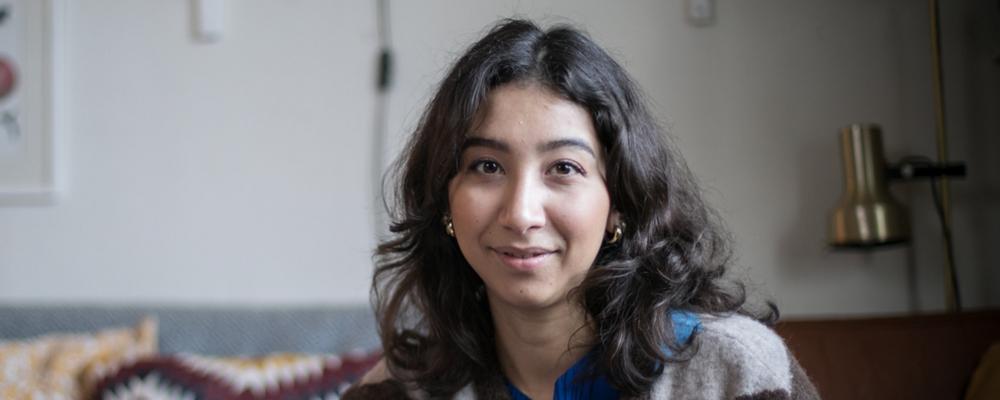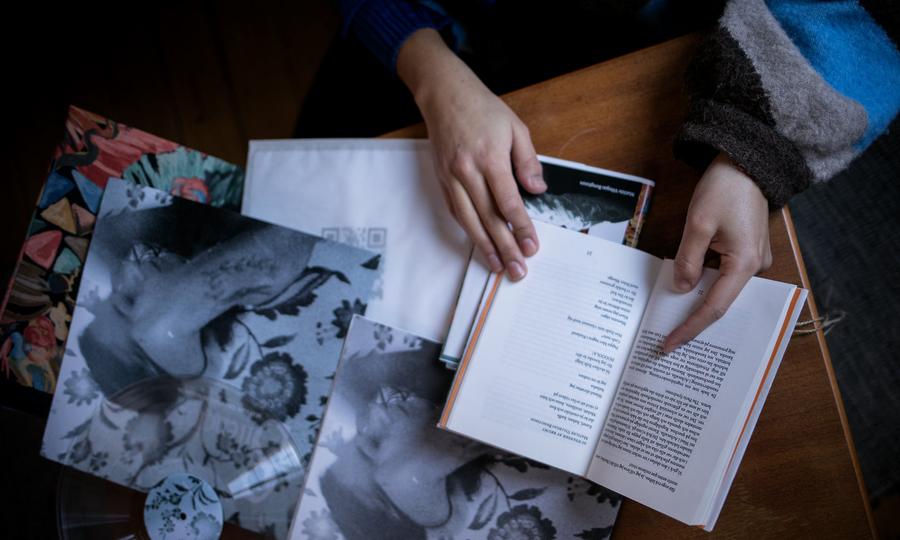
- Home
- News and events
- Find news
- Matilde gets inspired by people she meets in hospital
Matilde gets inspired by people she meets in hospital
Matilde Villegas Bengtsson began her career as an author when she was still a teenager, and she won the Lilla August Prize at the age of twenty. With success came high expectations as well as doubts. While earning a bachelor’s degree in literary composition at HDK-Valand and simultaneously training to become a nurse, she found her own formula for life as a writer. She has just finished her first novel.
From the window of her apartment, Matilde Villegas Bengtsson can see Masthugget Church and sense the magnificent view around the corner. With her puppy Flora for company, it is here she sat and wrote her novel. It is here too that she studied to become a nurse.
“The job as a nurse gives me economic security and establishes the calm and structure in everyday life that I need to write,” she says. “Not to mention inspiration: a hospital is full of powerful feelings, relationships and family structures that provide material for characters.”
Writing started as a fun game
It is almost a year since Matilde completed her studies in HDK-Valand’s Bachelor’s programme in literary composition, and she is beginning to find a way of living as a writer. It has taken time, and the choice of career has been anything but obvious.
“Although my father went to art school in Bolivia,” says Matilde, “I come from a family and a context in which there was not much room for culture. More than anything, it was unthinkable to have a job as an artist. My parents have always been forced to prioritise economic security, and it was only natural for me when it was time to choose my own career path.”
Matilde studied a programme of natural sciences, firmly intent on becoming a civil engineer. But she continued writing all the while. It began with a journal given to her by her aunt when she was six years old. At that time, writing was a fun game that was always with her, and when she became a teenager it served as a tool for understanding the world.
After a while, she began to wonder if there was any way to give writing legitimacy. And there was. She submitted short stories to various competitions and won every single time. In 2014, her success peaked with the Lilla August Prize for her short story “The Orangery”.
“It was completely crazy!” says Matilde. “The August Prize was the best thing that had ever happened to me. It probably also gave me a certain amount of hubris.”
Admitted to the programme in literary composition
She smiles at the memory. But unfortunately the award did not lead to the kind of opportunities and publishing contacts she had hoped for. It was a quite a height from which to fall. She struggled with expectations, rejection and insecurity.
After a year at the Jakobsberg Writer’s School, she encountered renewed resistance. She decided to abandon her writing ambitions and apply to a nursing programme. After three semesters of nursing school, she heard about the newly started programme in literary composition at the University of Gothenburg, and she could not help but apply.
“I got in, so I was forced to make a decision,” says Matilde. “For three days I hardly got out of bed, weighing my choices back and forth.”
In the end it was her mother’s voice that tipped the balance.
“She had realised finally that you just can’t choose to do something other than what your really want, and she encouraged me to accept.”

The programme gave her keys to the literary world
In spite of the pandemic, it was three very rewarding years. Matilde appreciated the opportunity to try out other art forms, which allowed her to develop on multiple levels in addition to as a writer. But perhaps the most significant was that the programme gave her keys to the literary world.
“I came to an understanding of different ways of working within the literary world,” she says. “And I got the chance to meet people and make friends with people working with similar challenges and questions.”
The bachelor programme also gave her new, larger perspectives with the help of theoretical and analytical tools. That aspect of the programme also had a downside, says Matilde.
“All of the words and discussions can easily become a competition for prestige among the initiated. For me it was important to not get caught up in that or dragged down by it and to keep focusing on my own path.”
It helped that, in addition to her studies, she worked on the side as an assistant nurse.
“In a hospital, you don’t get to choose who you meet. I encounter people with completely different backgrounds, capabilities and personalities. That gives me a valuable anchoring in the regular world and reminds me where I come from.”
The puppy Flora, having grown tired of Matilde’s talk, comes over with a toy in her mouth and looks up pleadingly at her. But Flora will have to wait a little longer.
Matilde recounts that after HDK-Valand she decided to complete her degree in nursing, and she will graduate this spring. At the same time, she is finishing work on her first novel, a reworking of the short story “The Orangery” that launched her career as a writer.
“I have found a way to be a writer that suits me,” she says. “And I’m not going to choose between writing and being a nurse. The dream is to be able to work with both, fifty-fifty.”
By Åsa Rehnström
